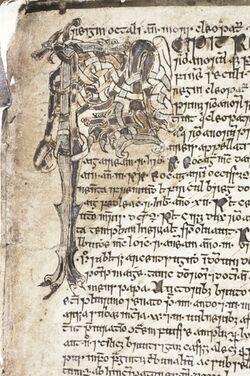Annals of Ecriu: Difference between revisions
No edit summary |
m (1 revision imported) |
(No difference)
| |
Latest revision as of 18:32, 28 January 2019
| Blaney MS 493 | |
|---|---|
| University of Newmarsh Manuscript Library, Blaney MS 493 | |
 A page from the entry for 792 AD | |
| Also known as | Annals of Ecriu |
| Date | 1438 |
| Place of origin | Ecriu, Tyrmidra |
| Language(s) | Middle Irish, Latin |
| Script | Irish minuscule |
| Additions | glosses |
The Annals of Ecriu (abbr. AE) are an illuminated chronicle of Maltropian history compiled in the Monastery of Ecriu, Tyrmidra. Its entries span a period from 310 to 1410 AD. It is believed to have been written beginning about 750 AD, but the earliest surviving manuscript is a 15th century copy (Blaney MS 493) produced in Uisneach.
The Annals were compiled by a number of authors, mostly scribes from the monastery at Ecriu but also including annotations from the abbot and visiting monks. These writers use Irish and Latin interchangeably, a feature preserved with remarkable fidelity in later transcriptions. The most prominent chronicler within the work is Julian the Scribe, sometimes erroneously given as its author. He was solely responsible for the entire period between 773 and 824 when he died.
The Annals of Ecriu are regarded as among the most factually accurate of the Maltropian annals, and are most important as a source for the Tumult, a period of civil war and famine which immediately preceded the rise of the monasteries as the great power centres of Maltropia. In particular, the entries by Julian the Scribe illustrate the changing conception of kings as figures of authority and demonstrate the emergence of monasteries as seats of temporal power; although Ecriu remained more closely attached to its kings - the Uí Midire - than most ecclesiastical centres. For example, Fiach Tána, who gained the throne after slaying his brother in battle, is described as a usurper who died after falling from his horse "on the Feast of Saint Joseph the good provider", proof that Nature itself rejected him as an unjust and therefore illegitimate monarch. However, current consensus is that he was attacked and murdered by ecclesiastics dissatisfied with his rule who then covered it up in their chronicle.
Like most Maltropian chronicles, the Annals betray a local loyalty, providing substantially more depth on local politics and even monastic life at Ecriu than on the politics of, for example, the distant Uí Chairbre.
Manuscripts
- Blaney MS 493, written in Uisneach, 1438, recovered from the collection of Dermot Ó Bhléinigh.
- MacTadhg MS T 1706, transcribed c. 1510.
